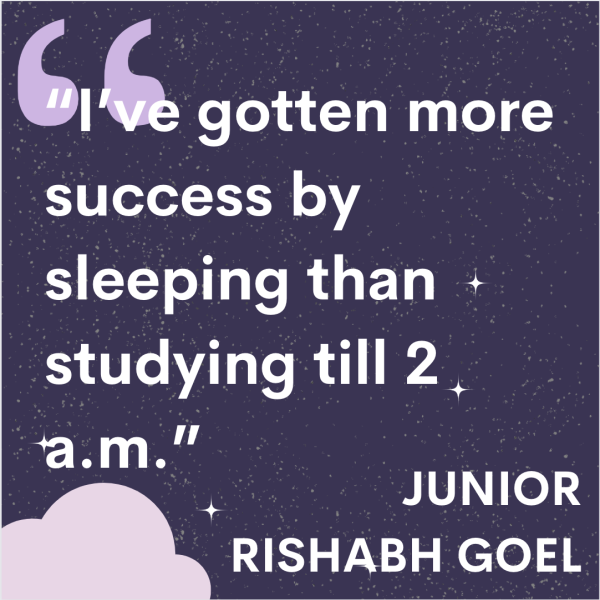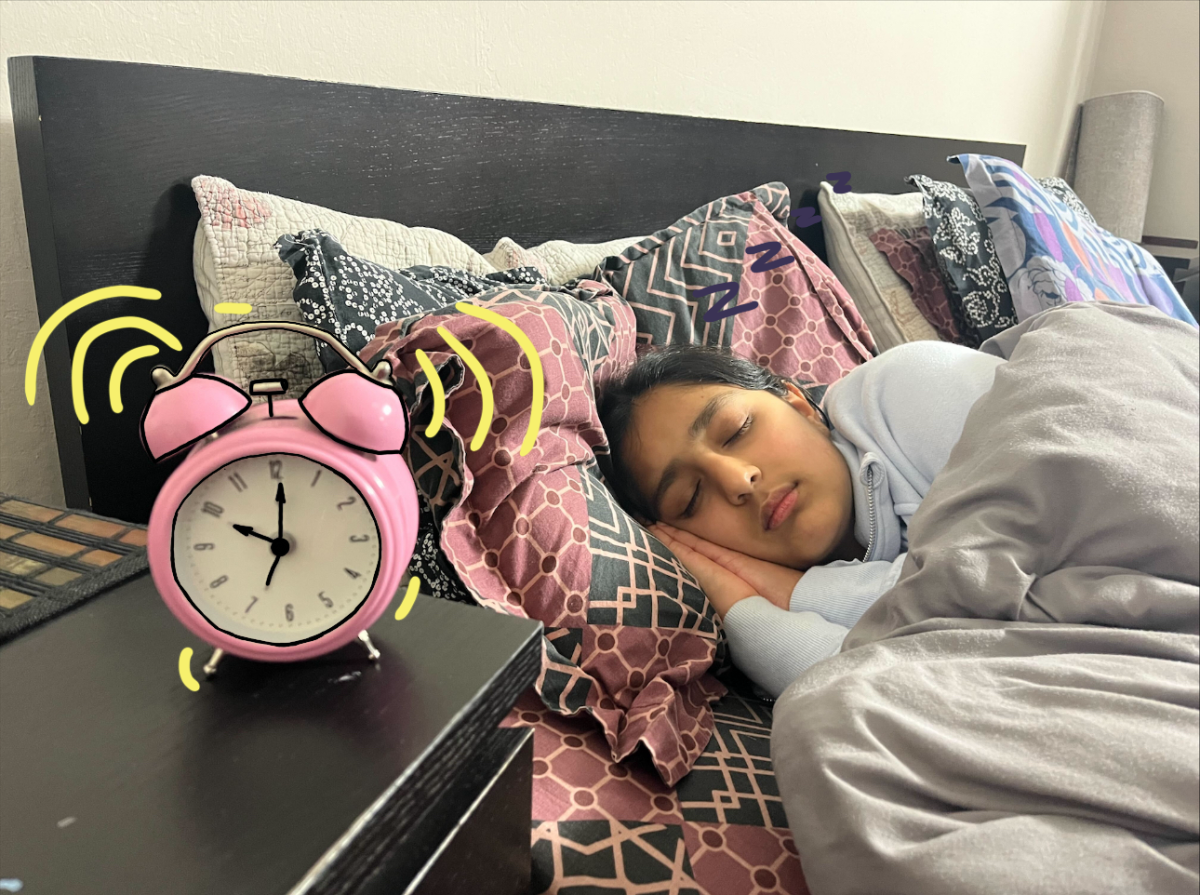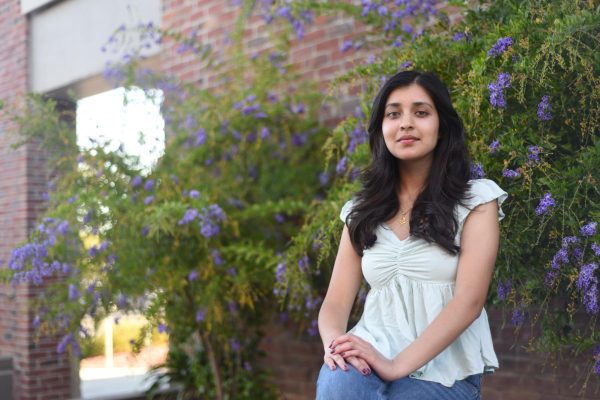At around 10 p.m. every night, senior Tanisha Kholiya sets aside her schoolwork and eases into her night routine to help her wind down. Beginning with a shower, she refreshes herself and washes away the day’s stress. Following that, Kholiya moves on to brushing her teeth and likes doing a simple skincare routine to help her practice self-care. She then picks up a book for around 10 to 15 minutes right before she drifts off to sleep at around 10:30 p.m. Kholiya says her routine helps her fall asleep and ensures that she is well-rested for the next day.
“I value sleep because it is good for my mental health and my physical health,” Kholiya said. “It makes me feel more energetic and I can focus more at school. It’s definitely easier to focus in class and especially on tests since I can actually use the things that I’ve studied and learnt for the test.”
Similarly, junior Rishabh Goel emphasizes sleeping on time and making sure he gets at least nine hours of sleep every day. He has done ample research on the importance of getting a healthy amount of sleep every day and says that sleeping for eight hours or more contributes to enhanced cognitive abilities and physical well-being.
“There’s a lot of studies that show that sleeping a lot is just better for your development,” Goel said. “If you sleep a lot then you’ll be smarter, stronger, have less stress, feel better, and remember more. So, if you think studying until 2 a.m. is a good idea, then you can keep doing that. Or you can just sleep and probably do better. I’ve gotten more success by sleeping than studying until 2 a.m.”
While adequate sleep helps reduce Kholiya’s stress levels, during times where she feels overwhelmed by schoolwork and extracurriculars, she tries to de-stress. For her, de-stressing is a key part of ensuring that she sleeps well every night.
“I think stress definitely does affect my sleep, because it’s harder to fall asleep when you’re stressed,” Kholiya said. “How I manage my stress is by journaling and going to the gym. I lift weights and I run. That’s a nice way to relieve stress.”
Contrary to Kholiya’s belief, Goel believes that stress actually helps him get better sleep as sleep itself helps him de-stress. He says that sleeping earlier and waking earlier allows him to refresh his mind and be able to work efficiently when he wakes up.
“If I have a lot of work and I get overwhelmed, then it gets to a point in time at night where I don’t feel like doing any more work,” Goel said. “I just feel like sleeping, so I just sleep instead. It’s so easy to sleep when you’re stressed. Sleeping is the easiest de-stressor because you can just forget about everything, and honestly, I sleep better when I’m stressed.”
Kholiya says that she also believes that most students at MVHS often have a bad sleep schedule. She attributes this to difficult classes that students take and how that causes students to have to stay up late to do that work.
“There’s a lot of people talking about how late they’re staying up and how busy they are with other activities,” Kholiya said. “I guess people kind of brag about how little sleep they get, which kind of adds to this idea that to be smart enough you need to be not sleeping and studying all the time. I think it adds a lot of pressure.”
Goel shares a similar sentiment on this topic as he also believes that MVHS’s environment detrimentally affects students’ sleep schedules. He points out how new policies put in place to help students get more sleep do not actually help them get sleep because they do not address the underlying issue of students’ heavy workloads.
“One-hundred percent of the school environment leads to bad sleep schedules,” Goel said. “MVHS has one of the worst homework policies. MVHS, or rather the state of California, moved school to 8:30 a.m. because of California’s law, since teenagers do not sleep enough. But that doesn’t really do anything. All that does is offset how much work you do, and move it later by one hour, so it doesn’t really do anything. So the issue is MVHS, especially the environment — not even the teachers.”
World Literature, Mythology and AVID teacher Megan Choate recognizes this issue at MVHS and gives tips to students as to how they can get better sleep. For Choate, sleeping well has been a key part of her life since high school where she would make sure that she went to sleep at 9 p.m. every day to get quality sleep. Since then, this habit has stuck with her and it helps her function better throughout the day and have a more effective day. For her students, Choate helps foster a class environment where students can manage their workload and handle stress more effectively.
“At the start of the year, I always tell students that I prioritize a balanced life and I think part of helping you maintain that balanced life is having an effective day, and to have an effective day you need to be getting sleep,” Choate said. “A practice that I have in my classroom is prioritizing a no homework model in my class. So, I don’t give homework to any of my students. It should help alleviate some of that load outside of class. The hope is that there’s a ripple effect of students being able to go to bed earlier and having a more well-rounded life.”
Not only does Choate like to discuss sleep management with students but also addresses it with parents. By emphasizing to both parents and students the importance of sleep, she hopes to support students in maintaining a healthy lifestyle.
“During Back to School Night with parents, I’ll share that I’m a believer in healthy sleep habits,” Choate said. “I feel my role at school is just reminding students to try and balance their time. So, that’s me supporting you with your time management and I think time management is related to being able to have a good quality sleep schedule. If you’re managing your time well in theory, you’re going to bed at 10 p.m. and getting your full eight, nine hours of sleep. My hope is that through those practices, it allows students access to better sleep.”
 Goel emphasizes how students do not see the long-term effects of their poor sleep habits and urges students to prioritize sleep for their future well-being. He wants students to understand the value of sleep and how it extends beyond academic performance.
Goel emphasizes how students do not see the long-term effects of their poor sleep habits and urges students to prioritize sleep for their future well-being. He wants students to understand the value of sleep and how it extends beyond academic performance.
“MVHS students’ sleep schedules are really bad,” Goel said. “You’re in high school so you don’t see anything. But when you’re fifty years old, you’re actually going to wish that you slept more when you were in high school. So honestly, if you get anything out of high school, just sleep enough. It’s not that hard and it’s pretty fun.”










